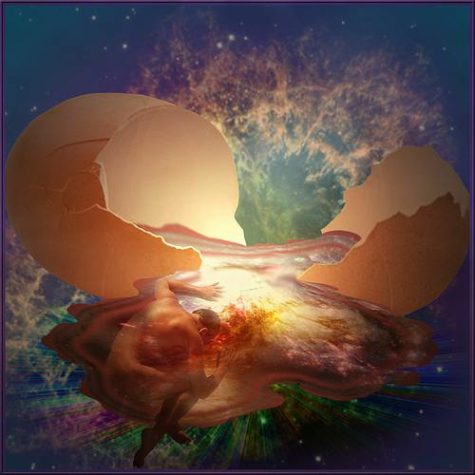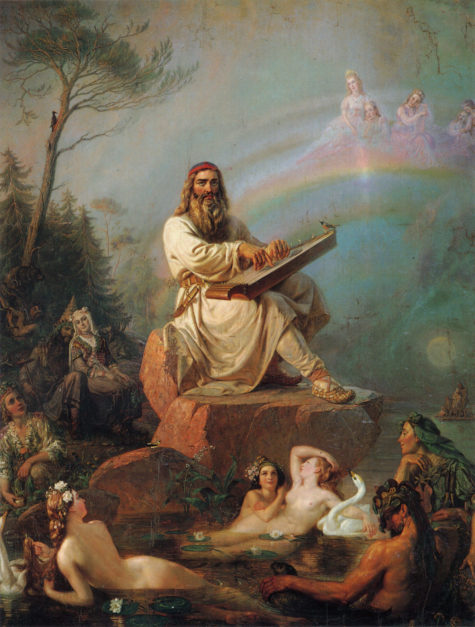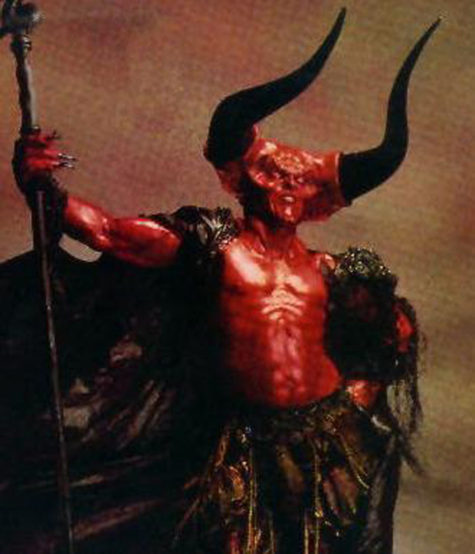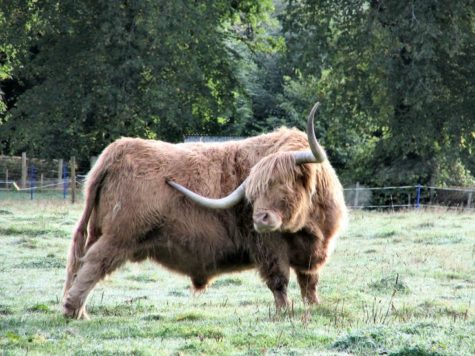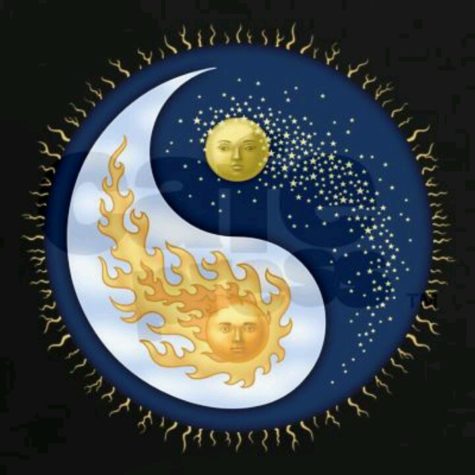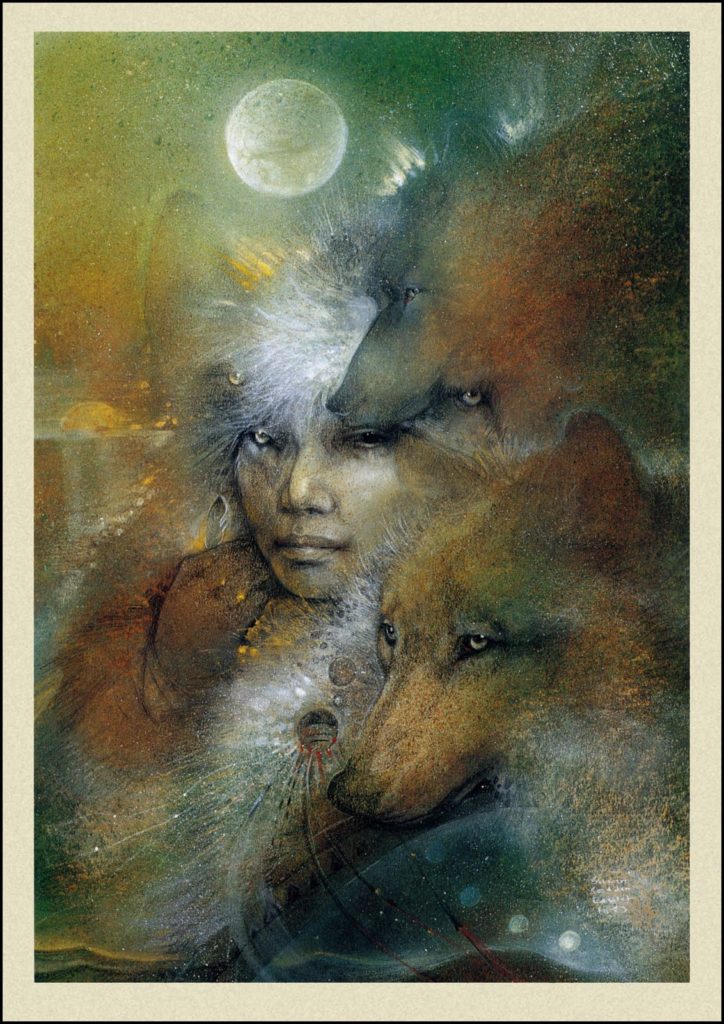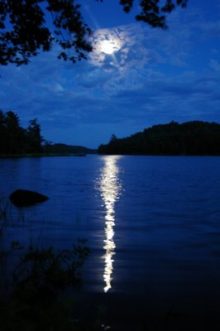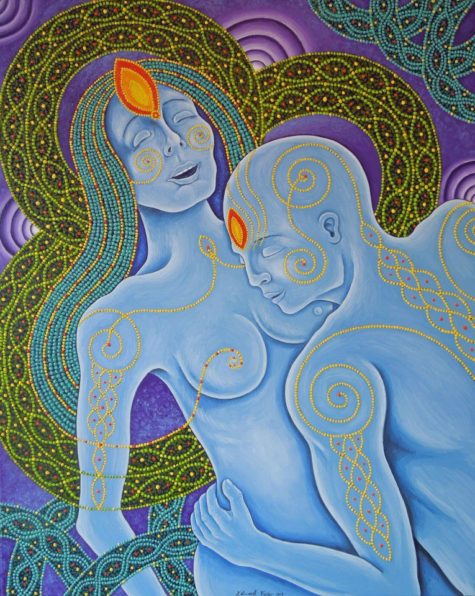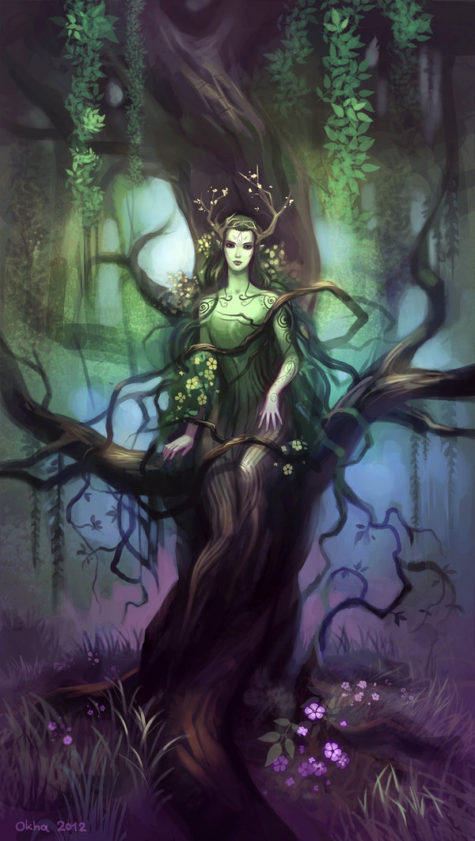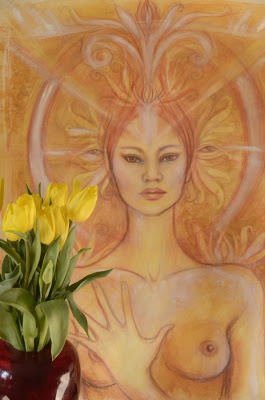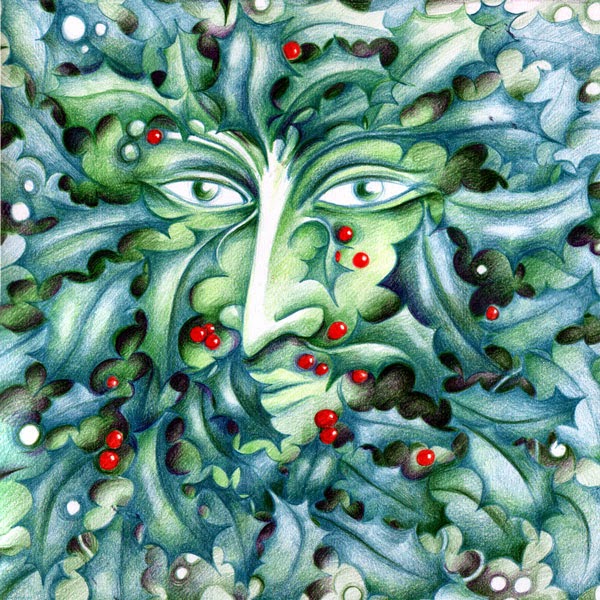The Birth of Vainamoinen
From the Kalevala, here is the story of the creation of the world, Ilmatar Daughter of Nature, and the birth of her son, Vainamoinen.
Lonely come the nights upon us,
Lonely dawn the brightening days;
Lonely born was Vainamoinen,
All alone, the poet immortal,
From the beautiful who bore him,
From his mother, Ilmatar –
She, the virgin of the air,
Beautiful maiden. Nature’s child,
Long maintained in holiness
Her eternal maidenhood
In the far-horizoned heavens,
Level meadows of the air.
But in time she wearied of it,
Was estranged from this odd living,
Always being by herself,
Ever living as a virgin
In those far-horizoned heavens,
In those vast and empty spaces.
So at length she then descended
To the seawaves down below,
To the open clear sea surface
Out upon the open ocean.
Suddenly a storm wind blew,
Out of the east an angry blast
Blew the water to a foam
Heaving up the rollers high.
By the wind the maid was rocked,
On a wave the maid was driven
Round about the blue sea surface
By the whirling whitecaps lifted
Where her womb the wind awakened
And the sea-foam impregnated.
Thus a full womb now she carried,
Long she bore her burdened belly,
Seven hundred years she bore it
For nine lifetimes of a man,
Yet the borning was unborn,
Still the fetus undelivered.
As the mother of the water
Aimlessly the virgin drifted:
She swam eastward, she swam westward,
She swam south and northwestward,
Swimming round the whole horizon
In the anguish of her birth pangs,
In her belly’s bursting pains.
Yet the borning was unborn,
Still the fetus undelivered.
Then she fell to weeping softly,
Said a word and spoke out thus:
“Woe is me, the water wanderer,
Luckless girl, misfortune’s child!
Now already I’m in trouble,
Shelterless beneath the sky,
Ever rocking on the seawaves
To be cradled by the wind,
To be driven by the billows
On these far-extending waters,
Endlessly repeated billows.
“Better had it been for me
To have stayed the airy virgin
Than to be as I am now
Drifting as the water-mother.
Its too cold for me to stay here,
Painful to be drifting here,
Wallowing in this watery waste.
“0 thou Ukko, lord of all,
Hear me, thou the all-sustainer:
Come, 0 come where thou art needed;
Come, 0 come where thou art called!
Loose the maiden from her misery
And the woman from her womb-ache;
Come thou quickly, soon arriving
Where thy help is sooner needed.”
Then a bit of time passed over
Like a tiny rash of rain,
When a scaup, the honest bird,
Came on hovering here and there
Searching for a nesting place,
For a spot to build her home on.
She flew eastward, she flew westward,
Flew to northwest and to southward
But she cannot find a spot
Even in the worst of places
Where to build her needful nest,
Where to take up her abode.
Hovering, fluttering back and forth
Thus she thought and pondered it:
“Must I make my home on wind,
Build my hut upon the billows
Where the wind can blow it over
Or a wave can wash away?”
So the mother of the water,
Water mother, airy maiden,
Raised her knee above the surface
And her shoulder from the wave
As a refuge for the scaup
And a welcome nesting place.
Then that scaup, the lovely bird,
Fluttering round and hovering over
Spied the water-mother’s knee
Lifted from the sea’s blue surface;
Took it for a grassy tussock
Or a tuft of new-grown turf.
Flies about, flitting here and there,
Settles on the lifted kneecap.
It is there she builds her nest,
There she laid her golden eggs –
Six were the golden eggs she laid,
But the seventh was of iron.
She began to hatch the eggs there,
Heating up the lifted kneecap;
Brooded one day, brooded two days,
Even on the third day brooding.
Then the mother of the water,
Little mother, airy maiden,
Felt the rising heat upon her,
Felt as if her skin were scorching,
Thought her kneecap was on fire,
That her very veins were melting.
All at once she jerked her knee,
Agitating every member,
And the eggs rolled in the water
To the tumbling of the tides;
Into bits the eggs were broken,
Shattered into crumbs and pieces.
But the eggs and pieces were not
Mixed up with the mud and water
For at once the crumbs grew comely
And the pieces beautiful.
One egg’s lower half transformed
And became the earth below,
And its upper half transmuted
And became the sky above;
From the yolk the sun was made,
Light of day to shine upon us;
From the white the moon was formed,
Light of night to gleam above us;
All the colored brighter bits
Rose to be the stars of heaven
And the darker crumbs changed into
Clouds and cloudlets in the sky.
Quickly now the time goes forward
As the hurrying years pass by
While the newborn sun is shining
And the newborn moon is gleaming.
Still the mother goes on swimming,
Water mother, airy maiden,
Swimming on those peaceful waters
Over misty seawaves wandering.
Before her flowed the liquid deep,
Behind her shone the empty heaven.
In the ninth year, tenth of summers,
Raised her head out of the sea,
Lifts her crown above the water;
Set to work on her creations,
Hastens on her handiwork,
Out upon the clear sea surface,
Out upon the open ocean.
Where she gave her hand a turn
There she put the capes in order;
Where her foot struck bottom, there
Grottoes for the fish were formed;
Where the bubbles reached the surface
There the deeps were made still deeper.
Where her side had scraped the land
There the level shores appeared;
Where she turned her foot to landward
There the salmon grounds were formed,
And wherever her head touched land
There the broad bays opened out.
Swimming farther out from shore
She halted on the smooth sea surface
Where she made the little islands.
Then she raised the hidden reefs
Where the grounded ships would founder,
Many a seaman lose his life.
Now the islands were in order
And the small isles of the sea;
Pillars for the sky were planted,
Lands and continents created;
On the rocks the writs were written”
And the signs drawn on the cliffs.
Yet Vainamoinen is unborn,
Poet eternal not emerged.
Old reliable Vainamoinen
Traveled in his mother’s womb,
Traveled there for thirty summers
And as many winters too
On the ocean now so peaceful
In that misty world of water.
He is pondering, he is thinking,
How to live or how survive
In this dismal hiding place,
In this narrowest of dwellings
Where he never saw the moon,
Never got a glimpse of sunlight.
So he speaks out in these words,
Says it in these sentences:
“Free me. Moon, and Sun, release me!
Thou, Great Bear, do ever guide me,
Lead a man here through strange doors,
Through these unfamiliar gates.
Release me from this narrow nest,
From this shut-in dwelling place!
Guide the traveler to the land,
Child of mankind to the open
To behold the moon in heaven
And to wonder at the daylight,
Get to know the Great Bear’s grandeur
Or just to stare up at the stars!”
Since the moon did not arrive
Nor the sun come to release him,
Alienated from his birth time,
Impatient of this dull existence,
He pushed against his prison lock
Pressing with his nameless finger,
Slid the bony bolt aside,
With his left toe opened it;
Scrabbling with his nails he came
Crawling through the exit door.
Headlong in the sea he tumbled
With a hand-turn in the waves.
There the man was left alone
In the rough care of the billows.
There he floated for five years,
Six, seven, even eight years,
Stopped at last upon the surface
There beside a nameless headland,
On a treeless continent.
Struggling up with knee and elbow
He stood up to see the world:
To behold the moon in heaven
And to wonder at the daylight,
Get to know the Great Bear’s grandeur
Or just to stare up at the stars.
That was the birth of Vainamoinen.
Such the daring poets descent
From the beautiful who bore him,
From his mother, Ilmatar.
Wainamoinen’s Harp Songs
The Kalevala recounts a battle of wits between three wizard brothers and the witch goddess, Louhi. It is a treasure trove of ancient shamanistic practices and spells. Here’s a reading:
Wainamoinen’s Harp Songs
Then the singer of Wainola
Took the harp of his creation,
Quick adjusting, sweetly tuning,
Deftly plied his skillful fingers
To the strings that he had fashioned.
Now was gladness rolled on gladness,
And the harmony of pleasure
Echoed from the hills and mountains:
Added singing to his playing,
Out of joy did joy come welling,
Now resounded marvelous music,
All of Northland stopped and listened.
Every creature in the forest,
All the beasts that haunt the woodlands,
On their nimble feet came bounding,
Came to listen to his playing,
Came to hear his songs of joyance.
Leaped the squirrels from the branches,
Merrily from birch to aspen;
Climbed the ermines on the fences,
O’er the plains the elk-deer bounded,
And the lynxes purred with pleasure;
Wolves awoke in far-off swamp-lands,
Bounded o’er the marsh and heather,
And the bear his den deserted,
Left his lair within the pine-wood,
Settled by a fence to listen,
Leaned against the listening gate-posts,
But the gate-posts yield beneath him;
Now he climbs the fir-tree branches
That he may enjoy and wonder,
Climbs and listens to the music
Of the harp of Wainamoinen.
~RUNE XLI.
The epic poem, Kalevala, is celebrated by the Finns this day (February 28) with parades and readings from the poem. The Kalevala is a 19th century work of epic poetry compiled by Elias Lönnrot from Finnish and Karelian oral folklore and mythology. The above translation is by John Martin Crawford,
Old Stories About the Devil
When the devil appeared to Cuvier, the great man looked at him nonchalantly and asked curtly: “What do you wish of me?” “I’ve come to eat you !” said the devil. But the great anatomist’s shrewd eye had already examined him. “Horns and hoofs !” he retorted, “granivorous. You can’t do it!” Whereupon, outfaced by science, Satan departed.
Plinius Secundus remembers a house at Athens which Athenodorus, the philosopher, hired, and which no man durst inhabit, for fear of the haunting devils. Hesperius, the tribune’s house, at Zubeda, near the city of Hippos, was also thus haunted; and he was so much vexed with these demons and ghosts that he could not rest.
Vasari, the Italian painter and biographer (d. 1574), tells the following strange tale of Spinello of Arezzo. When this artist had painted, in his famous fresco of the fall of the rebellious angels, the devil as a hideous demon and with seven heads about his body, the fiend came to him in the very bodily form he had conceived him, and asked the artist where he had seen him so, and why he had portrayed him in such a manner and put such a shame upon him? When Spinello came out of the vision, he was in a state of terror, and falling into a melancholy, soon died.
A mythical personage who originated in German folklore, was Friar Rusk. He was a fiendish looking creature who was really a devil, and kept monks and friars from leading a religious life. He was probably at one time a good natured imp like Robin Goodfellow, but under the influence of Christian superstition, he became the typical emissary from Satan who played tricks among men calculated to set them by the ears, and who sought by various devices, always amusing, to fit them for residence in his master’s dominions. (Tuckerman, “History of Prose Fiction.”)
Freischiitz, the free shooter, is a name given to a legendary huntsman who, by entering into a compact with the devil, procures balls six of which infallibly hit, however great the distance, while the seventh, or according to some of the versions, one of the seven, belongs to the devil, who directs it at his pleasure. Legends of this nature were rife among the troopers of Germany in the fourteenth and fifteenth centuries, and during the Thirty Years’ War. The story first appeared in Apel’s “Ghost Book,” and was made known to all civilized countries by Weber’s opera in 1821. Continue reading
The Magnificent Bull
My bull is white like the silver fish in the river,
White like the shimmering crane bird on the river bank,
White like fresh milk!
His roar is like the thunder to the Turkish cannon on the steep shore.
My bull is dark like the raincloud in the storm.
He is like summer and winter.
Half of him is dark like the storm cloud
Half of him is light like sunshine.
His back shines like the morning star.
His brow is red like the beak of the hornbill.
His forehead is like a flag, calling the people from a distance.
He resembles the rainbow.
I will water him at the river,
With my spear I shall drive my enemies.
Let them water their herds at the well;
The river belongs to me and my bull.
Drink, my bull, from the river;
I am here to guard you with my spear.
– Traditional Dinka Tribe, Africa
Invocation to the Sun and Moon
Lord Sun, life of day!
In your fire-boat gliding through golden rays!
Extend yourself, with hands of light,
To us who worship in your sight,
And in your ancient names rejoice,
And hear the mystery of your voice.
Lady Moon, cloud bound,
Of liquid light and pale hounds,
Course among us — Your light diffuse!
Shed your blessings on us who choose
The evening worship by silver flame,
Singing your thousand living names.
Invocation by Olwen Fferyllt
La Loba
There is an old woman who lives in a hidden place that everyone knows in their souls but few have ever seen. As in the fairy tales of Eastern Europe, she seems to wait for lost or wandering people and seekers to come to her place.
She is circumspect, often hairy, always fat, and especially wishes to evade most company. She is both a crower and a cackler, generally having more animal sounds than human ones.
I might say she lives among the rotten granite slopes in Tarahumara Indian territory. Or that she is buried outside Phoenix near a well. Perhaps she will be seen traveling south to Monte Alban in a burnt out car with the back window shot out. Or maybe she will be spotted standing by the highway near El Paso, or riding shotgun with truckers to Morelia, Mexico, or walking to market above Oaxaca with strangely formed boughs of firewood on her back. She calls herself by many names: La Huesera, Bone Woman; La Trapera, The Gatherer; and La Loba, Wolf Woman.
The sole work of La Loba is the collecting of bones. She collects and preserves especially that which is in danger of being lost to the world. Her cave is filled with the bones of all manner of desert creatures: the deer, the rattlesnake, the crow. But her specialty is wolves.
She creeps and crawls and sifts through the mountains, and arroyos, looking for wolf bones, and when she has assembled an entire skeleton, when the last bone is in place and the beautiful white sculpture of the creature is laid out before her, she sits by the fire and thinks about what song she will sing.
And when she is sure, she stands over the criatura, raises her arms over it, and sings out. That is when the rib bones and leg bones of the wolf begin to flesh out and the creature becomes furred. La Loba sings some more, and more of the creature comes into being; its tail curls upward, shaggy and strong.
And La Loba sings more and the wolf creature begins to breathe.
And still La Loba sings so deeply that the floor of the desert shakes, and as she sings, the wolf opens its eyes, leaps up, and runs away down the canyon.
Somewhere in its running, whether by the speed of its running, or by splashing its way into a river, or by way of a ray of sunlight or moonlight hitting it right in the side, the wolf is suddenly transformed into a laughing woman who runs free toward the horizon.
So remember if you wander the desert, and it is near sundown, and you are perhaps a little bit lost, and certainly tired, that you are lucky, for La Loba may take a liking to you and show you something – something of the soul.
~from Women Who Run With the Wolves
by Clarissa Pinkola Estes
Look!
The Courtship of Inanna and Damuzi
The courtship of Inanna and Dumuzi is one of the oldest love poems from the ancient world. It is a story of love between the gods (although some argue that Dumuzi was a real person, who rose to power, and so attained mythical divine status). When the gods consummate their love the result is fecundity on earth, particularly for their worshipers.
This Sumerian text is often compared to the Song of Songs. The Egyptian love poetry makes a better parallel, but there are some connections. However, a word of warning, this is much more explicitly sexual than the Song of Songs, and, of course, it is about divine lovers.
Here it is:
The brother spoke to this younger sister
The Sun God, Utu, spoke to Inanna, saying:
‘Young Lady, the flax in its fullness is lovely,
Inanna, the grain is glistening in the furrow.
I will hoe it for you, I will bring it to you
A piece of linen, big or small, is always needed.
Inanna, I will bring it to you.’
‘Brother, after you’ve brought me the flax, who will comb it for me?
Sister, I will bring it to you combed.’
‘Utu, after you’ve brought it to me combed, who will spin it for me?
‘Sister, I will bring it to you spun.’
‘Brother, after you’ve brought the flax to me spun, who will braid it for me?
‘Sister, I will bring it to you braided.’
‘Utu, after you’ve brought it to me braided, who will warp it for me?’
‘Inanna, I will bring it to you warped.’
‘Brother, after you’ve brought the flax to me warped, who will weave it for me?’
‘Sister, I will bring it to you woven.’
‘Utu, after you’ve brought it to me woven, who will bleach it for me?’
‘Inanna, I will bring it to you bleached.’
‘Brother, after you’ve brought my bridal sheet to me,
Who will go to bed with me?
Utu, who will go to bed with me?’
‘Sister, your bridegroom will go to be with you
He who was born from a fertile womb,
He who was conceived on the sacred marriage throne
Dumuzi, the shepherd! He will go to bed with you.’
Inanna bathed and anointed herself with scented oil.
She covered her body with the royal robe
She arranged her precious lapis beads around her neck
She took the royal seal in her hand
Dumuzi waited expectantly
Inanna opened the door for him
Inside the house she shone before him
Like the light of the moon
Dumuzi looked at her joyously
He pressed his neck close against hers
He kissed her Continue reading
The Dryad
Here is a story about a Dryad by Hans Christian Anderson.
We are travelling to Paris to the Exhibition. Now we are there. That was a journey, a flight without magic. We flew on the wings of steam over the sea and across the land. Yes, our time is the time of fairy tales.
We are in the midst of Paris, in a great hotel. Blooming flowers ornament the staircases, and soft carpets the floors.
Our room is a very cozy one, and through the open balcony door we have a view of a great square. Spring lives down there; it has come to Paris, and arrived at the same time with us. It has come in the shape of a glorious young chestnut tree, with delicate leaves newly opened. How the tree gleams, dressed in its spring garb, before all the other trees in the place! One of these latter had been struck out of the list of living trees. It lies on the ground with roots exposed. On the place where it stood, the young chestnut tree is to be planted, and to flourish.
It still stands towering aloft on the heavy wagon which has brought it this morning a distance of several miles to Paris. For years it had stood there, in the protection of a mighty oak tree, under which the old venerable clergyman had often sat, with children listening to his stories.
The young chestnut tree had also listened to the stories; for the Dryad who lived in it was a child also. She remembered the time when the tree was so little that it only projected a short way above the grass and ferns around. These were as tall as they would ever be; but the tree grew every year, and enjoyed the air and the sunshine, and drank the dew and the rain. Several times it was also, as it must be, well shaken by the wind and the rain; for that is a part of education.
The Dryad rejoiced in her life, and rejoiced in the sunshine, and the singing of the birds; but she was most rejoiced at human voices; she understood the language of men as well as she understood that of animals.
Butterflies, cockchafers, dragon-flies, everything that could fly came to pay a visit. They could all talk. They told of the village, of the vineyard, of the forest, of the old castle with its parks and canals and ponds. Down in the water dwelt also living beings, which, in their way, could fly under the water from one place to another—beings with knowledge and delineation. They said nothing at all; they were so clever!
And the swallow, who had dived, told about the pretty little goldfish, of the thick turbot, the fat brill, and the old carp. The swallow could describe all that very well, but, “Self is the man,” she said. “One ought to see these things one’s self.” But how was the Dryad ever to see such beings? She was obliged to be satisfied with being able to look over the beautiful country and see the busy industry of men.
It was glorious; but most glorious of all when the old clergyman sat under the oak tree and talked of France, and of the great deeds of her sons and daughters, whose names will be mentioned with admiration through all time.
Then the Dryad heard of the shepherd girl, Joan of Arc, and of Charlotte Corday; she heard about Henry the Fourth, and Napoleon the First; she heard names whose echo sounds in the hearts of the people.
The village children listened attentively, and the Dryad no less attentively; she became a school-child with the rest. In the clouds that went sailing by she saw, picture by picture, everything that she heard talked about. The cloudy sky was her picture-book.
She felt so happy in beautiful France, the fruitful land of genius, with the crater of freedom. But in her heart the sting remained that the bird, that every animal that could fly, was much better off than she. Even the fly could look about more in the world, far beyond the Dryad’s horizon.
France was so great and so glorious, but she could only look across a little piece of it. The land stretched out, world-wide, with vineyards, forests and great cities. Of all these Paris was the most splendid and the mightiest. The birds could get there; but she, never!
Among the village children was a little ragged, poor girl, but a pretty one to look at. She was always laughing or singing and twining red flowers in her black hair.
“Don’t go to Paris!” the old clergyman warned her. “Poor child! if you go there, it will be your ruin.”
But she went for all that. Continue reading
The Golden Waterfall of Peace and Blessings
Golden Dakini
The Golden Waterfall of Peace and Blessings
I am the Dakini of calming, healing, and making whole
I am invoked when the meditator is tired, disillusioned, or sad
I come to aid those who have tried sincerely but have not the strength
To fight their way to liberation
I strengthen the weak, and bring idealism and compassion
I have them help themselves on their own path
by helping others.
What does spirituality mean?
It is more than renunciation, more than ambition, more than fighting temptation
It is helping the world as you pass through it
It is sanctifying all aspects of life and blessing them
It is seeing the divine in all things.
As a Dakini, I am a spiritual guide and inspirational muse
I nurture people along the path
I encourage them towards liberation
As the spirit seeks ever-greater beauty and freedom
I am the loving mother, the wise grandmother, and the charming beloved
I take many forms shining with the light of peace
When I appear in meditation, my light falls like a golden waterfall
Shining all around turning everything beautiful
I give patience and understanding, charity, and a desire to help
Those who know me look at the world in a different way.
I cannot solve all problems
I am not a god
But I am a helper, and in helping I find joy
I soothe the pains of loneliness, rejection, and false pride
I bring people to see truth
Visualize me sitting on a golden lotus,
against a golden setting sun
The lotus floats on waters that are deep blue and green
The sky is gold and pale blue
I wear golden jewelry and pearls,
and gold and white silk
My vajra crown is also made of gold
My face is smiling, and my long dark hair is graceful and curling
I hold a mirror and a mala of yellow topaz.
My music makes warm winds
and flows through nature
Like a breath of sweet air through a field of sunflowers
Meditation holds the danger of becoming rejecting and hard of heart
The danger of pride, hatred, anger, and superiority
I wash these away with my golden light
I give a path of peace and blessing
So that the seeker may walk a clear path
And the pebbles turn golden at his feet.
From: Buddha Nature
Worth Exploring
James Cheney: Invocation To The Dark Mother
Daniel: Prayer Before The Final Battle
blessed obyno: Queen of Ghosts
blessed obyno: Queen of Ghosts
Caerlion Arthur: The Great, Bloody and Bruised Veil of the World
